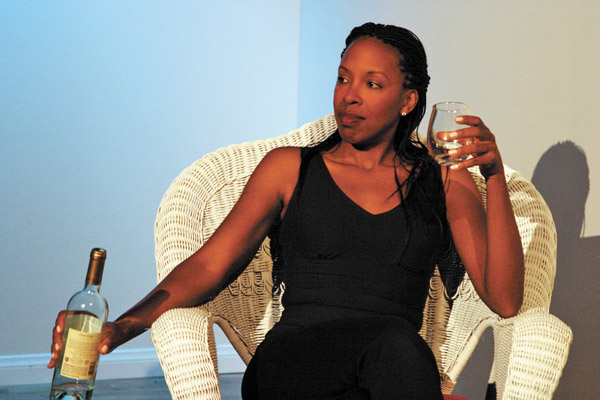
Writer and performer Miata Edoga bravely examines why no one can be crueler than one’s own flesh and blood.
Edoga’s ‘Beyond’ is nuanced and complex
BY SERGEI BURBANK | We are forever tweaking the checklist that determines how parents provide spotless childhoods in order to create perfectly well-adjusted adults. While opinions continue to change on how to feed, dress and otherwise protect children against this dangerous world, a constant ingredient is a loving and trusting relationship between parent and offspring. Yet even this basic ingredient is more complex and elusive than it first appears.
“A Step Beyond the Rain,” written and performed by Miata Edoga, unfolds in the form of short vignettes as three women — a mother and her two daughters — reconcile themselves to one daughter’s severe illness and the reverberations that illness has across all of their lives. As we are brought deeper and deeper into each character’s inner world, a complex portrait emerges, and even seemingly straightforward questions have nuanced answers. Is a parent’s role to swaddle a child in unconditional love, or must a parent hold a child to strenuous — even painful — high standards in order to prepare them for an unforgiving world?
Edoga’s portrait of a childhood home steeped in fear of a mother who demands a strict adherence to work and achievement, and a demanding near-invalid sister broadens beyond an initial catalog of wrongs visited upon the healthy daughter. As she delves into the minds and souls of each member of this triangle, she bravely examines exactly why no one can be crueler than one’s own flesh and blood.
The script, quite astutely, never attempts a full reconciliation between these women, as Edoga’s purpose is far subtler: she broadens the frame of the hard-as-tacks mother’s portrayal just enough to allow a glimpse into the source of that resolve, complicating the portrait without fundamentally changing it (or its consequences). We may not agree with her actions, but we understand them far better. The audience shares a parallel journey to her daughter’s — not far enough to forget or forgive, but perhaps enough to move forward. This is a story that emerges through careful subtraction. Like the characters themselves, we learn more by what is not said than what is.
One-person shows often devolve into a showcase of a given performer’s dexterity, prioritizing virtuosity over story. But under the able direction of Ashley Crow, this production veers away from strong delineation between characters, and presents a largely consistent tone. The point here is not to exhibit Edoga’s versatility as a performer, but rather to examine the tension between three powerfully driven women. A positive consequence is the lack of competition between the text and performer. The sparse set, sound design and performance all work towards a shared goal to serve the text. This approach does have its shortcomings, as the plot unfolds without much emotional differentiation. For fraught scenes of despair in a hospital, this works. It is less successful for moments which are described as being experienced with near giddiness, but are communicated with a sense of barely suppressed rage.
This restraint extends to all aspects of the overall production design. David Forest’s musical compositions help maintain a sense of continuity as the short scenes follow one upon the other, but otherwise sound is used only selectively (albeit effectively) to convey a sense of place. We are otherwise closely tied to this room and this woman as she struggles with her pain, her loss, and her hopes.
At The Steve & Marie Sgouros Theatre (115 MacDougal St., 3rd floor, btw. W. Third & Bleecker Sts.). Fri., 8/16 at 6pm, Wed., 8/21 at 3:45pm & Sat., 8/24 at 4:15pm. Tickets: $15 in advance, $18 at the door. Call 866-468-7619 or visit fringenyc.org. Also visit astepbeyondtherain.com. Note: This review first appeared on nytheatre.com (founded by Martin Denton, this paper’s Downtown theatre columnist).


































